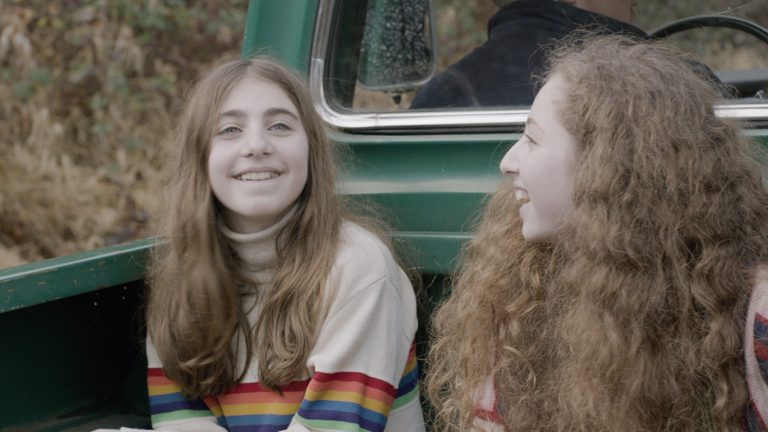Lane 1974 will likely be one of the most talked-about films of this year’s Seattle International Film Festival, in part because it is the debut film from a beloved, Seattle-area filmmaker, but also because it’s a truly great film, beautifully filmed, wonderfully acted and emotionally immersive.
Lane 1974 is SJ Chiro’s semi-autobiographical film about in hippie communes in the 1970s, told through the lens of Lane, a thirteen year old girl in Northern California, whose childhood is more volatile and unpredictable because her uncompromising mother burns bridges wherever she seems to go. It denies Lane and her two younger siblings any chance at stability in a life that is already spent “off-the-grid.” Young Sophia Mitri Schloss is a revelation in the title part, as is Katherine Moennig (who, for fans that have access to Showtime, can also be seen on “The L Word,” and “Ray Donovan”).
Lane 1974 uses Chiro’s memories of her childhood, as well as the memoir The Hypocrisy of Disco, by Clane Hayward, to provide the story for the movie. Cinematography from Sebastien Scandiuzzi vividly recreates the earlier era where this story is set.
I met up with SJ Chiro for an interview, to discuss the film, and bringing the Seattle filmmaking ethos to Northern California, while keeping Seattle filmmaking in Seattle.
Can we talk about how the idea for your film came about?
Yeah, absolutely. So, you know that it’s partially based on the way that I grew up, right? I’ve been thinking for a very long time about how to talk about that specific era, because I think it is, for various reasons that I can go into, my theories, that era’s kind of getting buried, especially from a child’s point of view. So, I always knew that I wanted to make a film about it, but my experience was too large, you know? I had a very hard time winnowing it down to a single story, so, then, when I read Clane Hayward’s book I was just like, “Eureka, I found it!”
If you read the book, you’ll see that it’s quite different on the whole, but she showed me a path, which I could see a path, in her writing, and that was in 2008. That’s exactly when I knew I was gonna make this. So, that was quite awhile ago, but in one way or another, I’ve been working on it ever since.
Wow, and can you talk about how you found the actors that played … Lane was fantastic, and her mother.
Casting is really crucial, as you know, to making good film. My producer and I were set up by our casting director, Amey René, in LA. I just saw a lot of young girls, and LA has a lot of young actresses, so, we were hopeful, but ultimately, after two days of seeing girls after girls after girls, no one had that thing that Lane needed, and there was definitely a very LA type of girl and type of acting that just wasn’t going to fit with it.
When we came back, Amey said, “Listen. I have a girl here, in Seattle that I’d love you to see,” and it was Sophia, and instantly, I knew that she would be amazing, but the weirdest thing is I had met her two years earlier, when she was just a ten year old girl, and her parents … We were at a party together, and I was talking about the film. I was always talking about the film, and they said, “oh, our daughter’s an actress.” My first thought was wait, now everybody’s daughter is going to be an actor.
But then I met her, and she was so charming, but she was tiny, and she had braces, and she just was not the right age, but it was odd that two years later, she comes back through casting, and she’s perfect. She is an amazing actress.
I’m so glad that she worked out! It was always funny to me when people would try to pitch their relatives in that way. I used to be a music blogger and more often than not, I would meet strangers who would tell me, “You know who would be good for you to write about? My nephew’s band,” and I’m sure it was-
I’ve definitely had that, too. “Oh, my son likes playing music. He could do your score.” Hmm. I don’t think so. But it really worked out with Sophia.
Yeah. Absolutely. And what about her mother?
Yes. So, that’s Katherine Moennig, and again, Amey and her associates sent me so many different women that they thought, might be appropriate, and I was just like no, no, no, no, no. There was something very specific that I knew this character had to have, and it was in her voice. She definitely could not have this aura of needing to please anyone, and as soon as I heard Kate Moennig’s voice, I knew she was definitely a contender, and then, I saw a little bit of her work, and I just knew this person is it, and really, she was the only one that I was set on.
So, then, Amey set up a meeting in LA, and we just went and had coffee, and she really loved the story. She really loved the character, because women are really not allowed to play these kind of not very nice people characters, people who are not into pleasing other people, I mean, that’s generally the roles that women are offered is those of caretakers, or pleasers…
You don’t really see a lot of characters that are less-than-great mothers, unless that’s the hook, like Mommie Dearest, or there’s just not a lot of complexity there.
Exactly. I think it’s very, very hard for audiences to watch not-great mothers, and they want mothers to kind of be idealized, but anyone who is a mother knows that it’s not that easy, and you will always make mistakes. Even if you’re the sweetest, kindest, cookie-baking mom, one day, you’re going to be annoyed.
This time last week I was doing another interview – actually, literally this time last week: 5:00 on Monday – with Alycia Delmore, and she was saying that Amey René also was also indispensable to casting Rocketmen…
Amey’s pretty amazing. She knows a lot of actors, and she knows who’s going to work for what, you know, locally and then, in LA as well.
Did I read that you also brought most of your crew from Seattle to Northern California?
We really tried to. Finances dictated that some crew we had to find there, and we were shocked at how difficult it was to find the right people once we got down there. We somehow dreamed that this oasis that is a Seattle film-making community exists everywhere, and it was a rude awakening to find out that no, it does not at all, you know? It was tough, and especially the production designer conundrum was a big one. I was reaching out to everyone at the last minute, “Do you know anyone in the area, blah blah blah, here’s the project.”
My friend Rena said, “Oh, I’d love to work on this, but I can’t,” and she said, “What about Cassie Miggins? She lives in Santa Rosa,” which is very close to where we were, and I knew Cassie from up here, so I knew that she had this Seattle-ethic. You know? She had this Seattle work-ethic. She understood it, and she had been out of design for a little bit, and so, when I approached her with this project, she was just in, immediately, and it was such a blessing, because she understood the Seattle aesthetic, and work ethic, and everything else, plus she lived there, so she could source things very easily, and she understood the kind of communal thing. I mean, when she came on to set, she was just like, “I’d love to live here.”
I told her, “Be careful what you wish for.” We shot on both the communes that I grew up on. When I was writing the script, I could really envision when she leaves for the last time, and then, you see the town in the distance. I don’t know if you remember this, but the things like that were super important to me; I could visualize them. I knew how to say that, visually.
I’ve interviewed a lot of directors who have made films in Seattle – not just Lynn Shelton and Megan Griffiths, and they all say that there’s something intangible about making a movie in Seattle, that the best crew members anywhere are in Seattle. I’ve had people say that they were shocked at how much harder it was to find good people to work on their film else than it as in was in Seattle.
People come here specifically to shoot. Todd Rohal came here to make a film, and he lives in Austin, which you would think, that’s a great film community, right? He came here. It’s interesting.
Do you have any theories as to why that is?
I don’t know how we got so lucky to have the great people that we do, and the buy-in from all these great people that art matters. I think that’s the bottom line, and I think we’re all struggling to be able to pay artists a living wage. It’s very difficult in the indie world, but so, what a lot of people do is work commercial jobs, and then they come together to make these kind of art pieces, which is so generous. But I think also its more than just altruism, I think they really get something out of it and see the value in it, and love the kind of coming together of all these different artists, and often, people will work together time and time again. So, it’s kind of fun to come in and work very intensely with these people that you know and then go back to the outer world.
One thing I wanted to ask you about and it seems to be what everyone is talking about, about how everyone loves shooting here, but the financial incentives and tax credits are not there and they have to go elsewhere…
I was at SXSW this year. My film premiered there. So, I had the opportunity to chit chat with Richard Linklater while I was there, which is kind of funny. I had met him when he came to SIFF with Dazed and Confused, and so, we were both totally young then, and we were chatting and he was saying he’s on board to shoot Where’d You Go Bernadette?
I loved that book.
But he was just like what is with your the tax credit initiative? What is going on? We want to shoot in Seattle, and it’s next to impossible. And I asked, “they want you go up to Vancouver, right?” He said “yes, and Vancouver looks nothing like Seattle.” I mean, everything that we see that takes place in Seattle, it’s easily recognizable to us as Vancouver.
It does not have the same vibe, and the filmmakers are very sensitive to that, so I really wish that lawmakers would understand the benefit. Somehow, the people who are against it, for whatever reason, love to couch it as though you’re taking food out of homeless peoples’ mouths, or you’re taking away from public schools, but that’s actually really not true, you know? Then, the other thing is, that this little money that you give out actually comes back in a greater sum, and then, you could really help artists who are struggling here, and want to stay here, but again, if they can’t get the bigger budget for things that need the tax incentive, then, they don’t have the jobs. I mean it’s just- It’s irritating.
Yeah. It is, and as a movie and TV viewer, it frustrates me to watch a show like “The Killing” or “iZombie,” which are set in Seattle, but filmed in Vancouver.
It’s really irritating, and it hurts artists most of all.
Agreed, 100%. Well, I want to get off this topic and move on to something that won’t raise my blood pressure, so what’s going on with this movie after SIFF?
This is a real surprise to me, because I didn’t even realize that we were in the running for this, but we were one of five independent films invited to Shanghai, so, I’ll be going with the film, which is super exciting for me, because I’ve never been to Asia at all. So, yeah, on the fifteenth, I’m out of here.
Wow. That’s so exciting.
It is. It’s super exciting. Then, it’s also playing in Sedona, on the same day that it plays here, so, I can’t be in Sedona, either. It’s irritating, because I wanna be with the film wherever it goes, and then, at the same time as it’s playing at Shanghai it’ll be playing at Provincetown, so, again, I can’t go, it just is heartbreaking because I’d love to go there and meet the film people there. And Sophia Coppola gonna be there (in Provincetown). She’s a special guest. So, it’s just a real knife in my heart. It would’ve been great to be there.
Were you really surprised, pleasantly so, about how your movie generated a lot of buzz at SXSW?
I was so relieved, because you just never know how it’s gonna be received. You can make something that’s very personal, and that you think is good, but you never know if it’s gonna connect with people or if they’re gonna like it. So, it was a huge relief, yeah. Those audiences were really wonderful.
It has to be a great feeling knowing that audiences in a city that’s not your hometown were liking your film. I mean, you can probably expect your SIFF screenings to do well…
It really was. I’m not gonna lie. It was really gratifying, and just really nice.
…and this weekend it’s playing twice, is that correct? And both the screenings are on standby…
Yeah. Friday night and then, Saturday afternoon. They sold out. Well, they went on stand by in ten days. So, that was pretty crazy. We’re hoping we’re going to be able to bring the film back later in the year because (producer) Jennessa (West) and I, every day we hear, “Hey, I can’t get a ticket.” Its just like I’m sorry. Hopefully, we’ll be able to bring it back later in the year.
And I’ll just ask, is there anything that you want to talk about that we didn’t talk about that you want to say while the tape recorder’s running?
Right. Such a good question, but I don’t know. I think that all my work has gotten to be, what do you call it … Okay. Roger Ebert has said that cinema is an empathy machine, and I agree. One thing that has kind of dogged me for kind of a long time is how women have been portrayed in film. So, I think women stories are important. I think women are human beings just like men, and I think they deserve to have their stories told. So, this kind of conventional wisdom that people don’t want to see films about women or girls, and I think that’s wrong, and I’m out to prove that it’s wrong. So far so good with this film.
I think conventional wisdom has definitely been wrong before, and I think we’re starting to see now more than ever that it is wrong. Films like Get Out and Wonder Woman. Well, Wonder Woman hasn’t come out yet, but it’s promising, and so many of us now that are just really having a lot of success, including the opening night film here (The Big Sick). We saw that film at SXSW, and, from my understanding, it was one of the highest-selling films at Sundance. So, they’re banking on really selling the heck out of that film, and I think they will. But yes, I’m definitely part of those warriors that are out to show a different face in film.
{Lane 1974 plays at Seattle International Film Festival on Friday, June 2 at SIFF Cinema Egyptian at 7:00 pm, and on Saturday, June 3 at SIFF Cinema Uptown at 2:30 pm.}




